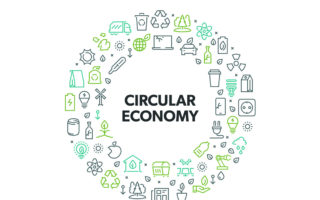AMGC members work toward a circular economy
Prime Minister Scott Morrison announced on Monday that the Federal Government considers environmental sustainability and the use of recycled content as a factor in determining value for money.
According to Prime Minster Morrison, “Every year we export some 1.4 million tonnes of waste plastic, paper, glass and tyres. Some of this material has been sorted, processed and will go on to form a valuable input to a commodity supply chain overseas, that’s true. But much of it is of low value and destined to find its way into the environment through waterways, or into our oceans.”
“Through months of consultation with industry, customers, retailers and brand-owners, the one issue everyone comes back to is the need to increase demand for recycled products.”
“Different countries have tried this in different ways… we want to encourage and incentivise the best. We want to support recycled products to compete in the market. We want to see industry step up and be part of the solution, which they want to do,” said Prime Minster Morrison.
Many Australian manufacturers—including several AMGC members—have already stepped up, implementing a circular economy approach that emphasises recycling, repurposing and remanufacturing.
Dresden Optics
AMGC member, Dresden Optics, is disrupting the eyewear market. The company manufactures an extremely flexible modular system for prescription glasses; every component interchangeable. Having experimented in making glasses from materials like milk caps and nylon netting, Dresden Optics’ goal is to use 100 per cent recycled materials.
However, Dresden is facing several major obstacles related to the highly mixed nature of waste materials collected. Some of the issues include sorting and cleaning, and in calibrating the manufacturing process to produce a quality product out of feedstock that is not in the same condition as a virgin polymer. To help overcome these challenges, Dresden Optics is working on a research project focused on the materials science needed to upcycle a range of plastics.
Native Secrets and SMaRT@UNSW
In 2014, Phil and Cherie Thompson established Native Secrets—a natural skin care range that draws upon generations of Aboriginal knowledge of medicinal plants.
An AMGC member, Native Secrets is working closely with SMaRT@UNSW (the Sustainable Materials Research and Technology Centre at the University of New South Wales). Led by Professor Veena Sahajwalla, the SMaRT@UNSW team is adding high-grade plastics to Native Secrets’ biowaste to make building panels. If the project is successful, Native Secrets plans to set up a micro-factory at their existing facilities in Dubbo to manufacture the building panels themselves.
Viridi Innovations
Viridi Innovations is extracting value from wine waste. In conjunction with their project partners (and with funding from AMGC), Viridi Innovations is validating a semi-continuous production process that will transform solid wine waste into tartaric acid and grape sugar; both key ingredients in food manufacturing.
Approximately 1.75 million tonnes of Winegrape is crushed in Australia each year, with 15 to 30 per cent of this ending up as landfill. Reducing this waste, while creating new revenue streams, is clearly beneficial.
Do You Recycle?
If your business is working towards a circular economy approach, or has a recycling, repurposing or remanufacturing program in place, then we want to hear from you.
AMGC is collecting examples of opportunities, challenges or breakthroughs in circular economy programs within the manufacturing industry, which will be supplied to the Department of Industry, Science, Energy and Resources.
To tell us your story, please contact AMGC.

